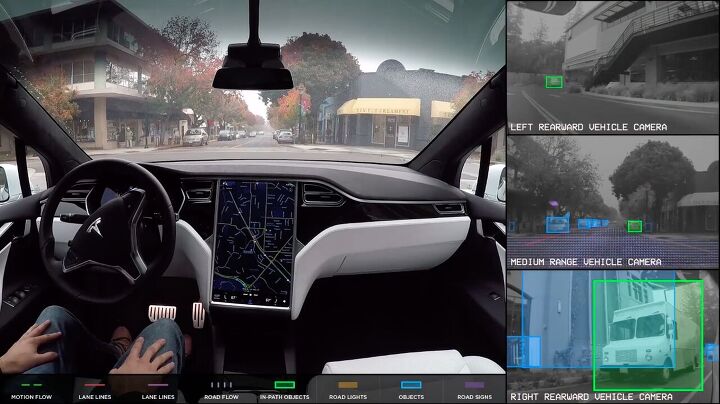Here's What the Average Buyer is Willing to Pay to Avoid Doing All the Driving

While many would argue that piloting your own vehicle is a key part of freedom and enjoyment of life, there are times when we really wish our vehicle could take us home from the bar. Cabs are expensive, Uber is potentially unavailable, and transit, well… it would have to be very good transit.
While vehicles with fully autonomous Level 5 driving modes remain out of reach, automakers are busy trying to wrestle that steering wheel from your hands. Already, most vehicles employ some level of mild self-driving abilities, whether it’s keeping your crossover between the lines, braking automatically to avoid that driver who’s allergic to signalling, or parallel parking itself. It’s nice to have some help sometimes.
However, just because people like protection on the road doesn’t mean they’re not also protective of their wallets. What is your average car buyer willing to pay for these conveniences?
According to a recent study uncovered by CNET, everyone has a price. One thing becomes clear when reading the results — fully autonomous driving remains a polarizing issue, with many respondents not willing to pay a cent for the technology. Others would rob a bank for the ability to turn over the driving responsibility to their car.
The study makes a point of covering the opinions of a diverse cross-section of Americans, closely aligning it with the existing mean for gender, income, age and ethnicity. Having delved deeply into past surveys on the subject, the study’s architects posed a number of questions. Among them, what dollar figure would participants be willing to pay to add semi-autonomous technology to a car (safety aids like automatic braking) or full autonomy.
The results revealed “a significant share of the sample is willing to pay above $10,000 for full automation technology while many are not willing to pay any positive amount for the technology.” On average, Americans said they’d be willing to pay about $3,500 for partial automation and about $4,900 for full automation.
That higher figure is considerably less than the results of a 2016 survey in Austin, Texas, which found participants willing to pay $7,253 for fully self-driving technology. People in Austin must really enjoy relaxing — or avoiding insurance claims.
As for self-driving enthusiasm, automakers had better take note. The countrywide study found people “split approximately evenly between high, modest and no demand” for the technology, which signals to automakers that buyers aren’t clamoring en masse to get their hands on it. At least, not yet. The study found many people remain unfamiliar with the newfound gadgetry, and could change their minds after learning more about it.
[Image: Tesla]

More by Steph Willems
Latest Car Reviews
Read moreLatest Product Reviews
Read moreRecent Comments
- Jkross22 Their bet to just buy an existing platform from GM rather than build it from the ground up seems like a smart move. Building an infrastructure for EVs at this point doesn't seem like a wise choice. Perhaps they'll slow walk the development hoping that the tides change over the next 5 years. They'll probably need a longer time horizon than that.
- Lou_BC Hard pass
- TheEndlessEnigma These cars were bought and hooned. This is a bomb waiting to go off in an owner's driveway.
- Kwik_Shift_Pro4X Thankfully I don't have to deal with GDI issues in my Frontier. These cleaners should do well for me if I win.
- Theflyersfan Serious answer time...Honda used to stand for excellence in auto engineering. Their first main claim to fame was the CVCC (we don't need a catalytic converter!) engine and it sent from there. Their suspensions, their VTEC engines, slick manual transmissions, even a stowing minivan seat, all theirs. But I think they've been coasting a bit lately. Yes, the Civic Type-R has a powerful small engine, but the Honda of old would have found a way to get more revs out of it and make it feel like an i-VTEC engine of old instead of any old turbo engine that can be found in a multitude of performance small cars. Their 1.5L turbo-4...well...have they ever figured out the oil dilution problems? Very un-Honda-like. Paint issues that still linger. Cheaper feeling interior trim. All things that fly in the face of what Honda once was. The only thing that they seem to have kept have been the sales staff that treat you with utter contempt for daring to walk into their inner sanctum and wanting a deal on something that isn't a bare-bones CR-V. So Honda, beat the rest of your Japanese and Korean rivals, and plug-in hybridize everything. If you want a relatively (in an engineering way) easy way to get ahead of the curve, raise the CAFE score, and have a major point to advertise, and be able to sell to those who can't plug in easily, sell them on something that will get, for example, 35% better mileage, plug in when you get a chance, and drives like a Honda. Bring back some of the engineering skills that Honda once stood for. And then start introducing a portfolio of EVs once people are more comfortable with the idea of plugging in. People seeing that they can easily use an EV for their daily errands with the gas engine never starting will eventually sell them on a future EV because that range anxiety will be lessened. The all EV leap is still a bridge too far, especially as recent sales numbers have shown. Baby steps. That's how you win people over.

































Comments
Join the conversation
The survey is flawed because it continues to propagate the assumption that the current model of car ownership will continue. Level 5 vehicles will be a shared resource, ready to be summoned via your phone app. The notion of one to one car ownership for the vast majority of vehicles will likely become as outdated as having to worry about finding a parking spot for your car.
The majority of my driving is two lane, tree lined highway but I would gladly pay for the people that sit in the drivers seat eating, smoking, applying make up and giving themselves a Brazilian all at the same time while posting it all on social media the technology for that car to drive itself.